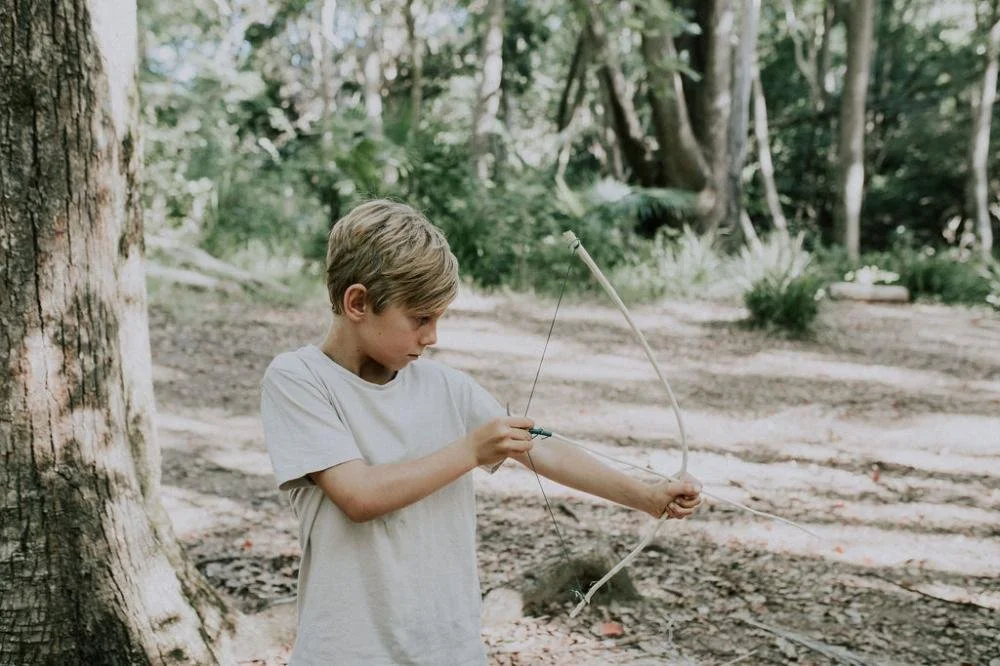The Truth About Weapons Play: It's Not About Violence—It's About Imagination
Parents often hesitate when they see children playing with sticks, crafting pretend weapons, or engaging in games that mimic battles or adventures.
There's a common worry: Will this encourage violent behavior?
However, research and child development experts suggest that weapons play, when guided appropriately, is not a precursor to violence. Instead, it is an imaginative outlet that fosters creativity, problem-solving, and emotional resilience.
Imagination at Work, Not Aggression
When children turn a stick into a sword or a bow, they aren't promoting harm—they're stepping into a world of make-believe. In these scenarios, the focus isn’t on hurting others but on storytelling, role-playing, and exploring concepts of bravery, heroism, or survival.
Pretend play, including weapons play, allows children to process big emotions, explore power dynamics, and rehearse social interactions in a safe and controlled way.
What the Research Says
Experts in child psychology and play therapy, like Dr. Stuart Brown, emphasise that play, including pretend weapons play, is a fundamental part of healthy development.
Studies show that children who engage in imaginative play develop better social skills, empathy, and problem-solving abilities. Weapons play offers a way for kids to work through concepts of conflict and resolution in a non-threatening environment.
Debunking the Myth of Violence
It’s important to distinguish between imaginative weapons play and actual aggression.
Weapons play is rooted in fantasy and cooperative storytelling, while aggression is about harming others.
In fact, children who have the freedom to explore these themes in play often exhibit less aggressive behavior in real-life situations because they’ve practiced navigating conflict through their imagination.
Why Weapons Play Matters
Building Emotional Resilience
Kids use weapons play to act out feelings of powerlessness or fear. In doing so, they process these emotions in a safe way, building resilience.Fostering Creativity and Problem-Solving
Turning natural materials like sticks or bamboo into pretend tools requires ingenuity. Children experiment with design, balance, and function, exercising their creative muscles.Encouraging Cooperation and Empathy
Group weapons play often involves negotiation, collaboration, and shared rules. Kids learn how to work together, resolve disagreements, and respect boundaries.
How Parents Can Support Safe and Meaningful Play
If you’re uneasy about weapons play, you’re not alone! Here are some ways to ensure that your child’s play is constructive and safe:
Set Clear Boundaries: Explain that weapons in play are for storytelling and games, not for causing harm to others.
Focus on Context: Frame the play as imaginative and adventurous—emphasize that these are tools for pretend heroes and explorers.
Use Teachable Moments: When conflicts arise during play, guide your child in resolving them peacefully, reinforcing empathy and communication.
Provide Supervision: Ensure that any play involving hand tools or crafted weapons is done under supervision with safety measures in place.
We’re Learning Too…
As playworkers, we’re constantly checking in with ourselves about boundaries with weapons play. This is also a conversation that we continue to have with our audience, families and our team, because we’re all figuring it out as we go.
We also acknowledge that we’re exploring this issue in Australia, where firearms are not part of everyday life. When we’ve raised this topic in the past, parents and educators have voiced their concerns about kids exploring gun play.
Generally at forest school, our weapons play is focused on primitive weapons, but we have encountered children who are avid Fortnite fans brandishing stick guns throughout the forest. We keep a close eye on this play, and keep this research in mind when it happens. When it verges on violent and aggressive play, we step in and redirect, reaffirming our values of respect and inclusive play. Generally, we find that kids are more excited to play with primitive weapons they can make themselves, like stick swords, spears and bows & arrows.
To dive deeper into this topic, check out our previous blogs on reframing weapons play, stick play and our guide to rough and tumble play.
A Safe Space for Adventure
At Wildlings Forest School, we embrace weapons play as part of risky play. Our holiday programs offer kids the chance to craft, imagine, and explore in a safe, supervised environment, helping them build confidence, resilience, and creativity.
This summer, let your child’s imagination run wild with stick swords, bamboo spears, and adventures among the trees. Book now and watch them thrive through the transformative power of nature play!
Learn More About Our Holiday Programs in Brisbane and the Sunshine Coast.
Written by Ellen Nesbitt. Ellen is a nature play advocate and creative writer with a passion for helping families connect with the outdoors. She is dedicated to exploring ways to nurture children's creativity, independence, wellbeing and love for nature.
